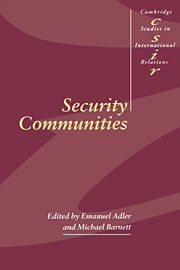Book contents
- Frontmatter
- Contents
- Notes on contributors
- Acknowledgements
- Part I Introduction and theoretical overview
- Part II Studies in security communities
- 3 Insecurity, security, and asecurity in the West European non-war community
- 4 Seeds of peaceful change: the OSCE's security community-building model
- 5 Caravans in opposite directions: society, state and the development of a community in the Gulf Cooperation Council
- 6 Collective identity and conflict management in Southeast Asia
- 7 An emerging security community in South America?
- 8 Australia and the search for a security community in the 1990s
- 9 The United States and Mexico: a pluralistic security community?
- 10 No fences make good neighbors: the development of the US-Canadian security community, 1871–1940
- 11 A neo-Kantian perspective: democracy, interdependence and international organizations in building security communities
- Part III Conclusions
- Index
- CAMBRIDGE STUDIES IN INTERNATIONAL RELATIONS
5 - Caravans in opposite directions: society, state and the development of a community in the Gulf Cooperation Council
Published online by Cambridge University Press: 30 October 2009
- Frontmatter
- Contents
- Notes on contributors
- Acknowledgements
- Part I Introduction and theoretical overview
- Part II Studies in security communities
- 3 Insecurity, security, and asecurity in the West European non-war community
- 4 Seeds of peaceful change: the OSCE's security community-building model
- 5 Caravans in opposite directions: society, state and the development of a community in the Gulf Cooperation Council
- 6 Collective identity and conflict management in Southeast Asia
- 7 An emerging security community in South America?
- 8 Australia and the search for a security community in the 1990s
- 9 The United States and Mexico: a pluralistic security community?
- 10 No fences make good neighbors: the development of the US-Canadian security community, 1871–1940
- 11 A neo-Kantian perspective: democracy, interdependence and international organizations in building security communities
- Part III Conclusions
- Index
- CAMBRIDGE STUDIES IN INTERNATIONAL RELATIONS
Summary
The states that comprise the Gulf Cooperation Council - Oman, Bahrain, the United Arab Emirates, Kuwait, Qatar, and Saudi Arabia - are not a security community. Nor do we anticipate their becoming a security community in the near future. Indeed, for most of its history the Gulf Cooperation Council (GCC) demands a realist reading and little else. The proximate causes of the formation of the GCC are to be found not in deep social structural factors pushing toward integration but in immediate regime security needs; specifically, the GCC was born in the circumstances of Iranian Revolution and the ongoing and escalating Iraq-Iran War, suggesting little more than a classic security alliance. The fifteen years since its birth also favor a strict and secular realism. As the Iran-Iraq War progressed the GCC states experimented with some modest, but for all practical purposes inconsequential, military cooperation. The end of the Iran-Iraq War abruptly halted such experimentation. The 1990–91 Gulf War produced a shortterm upswing in group cohesion but the post-war period was characterized by increasing rivalries, a halt to any meaningful militarycoordination and a return of border disputes among the GCC states. The GCC's trajectory seems consistent with alliance formation - formed in response to specific security threats, enduring as those threats endure, and fraying as those threats recede. In general, statism and realism mark the history of the GCC states.
- Type
- Chapter
- Information
- Security Communities , pp. 161 - 197Publisher: Cambridge University PressPrint publication year: 1998
- 22
- Cited by

